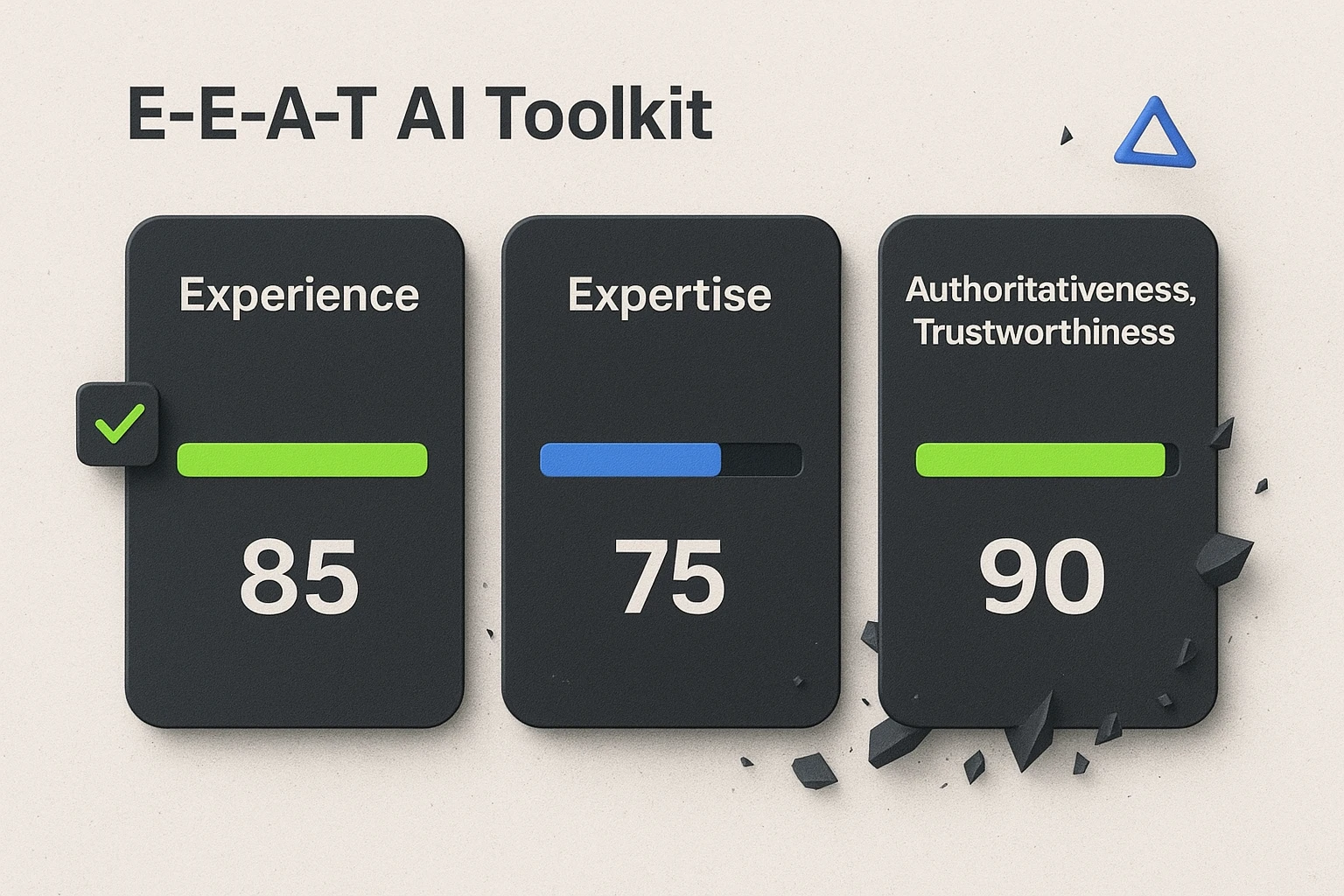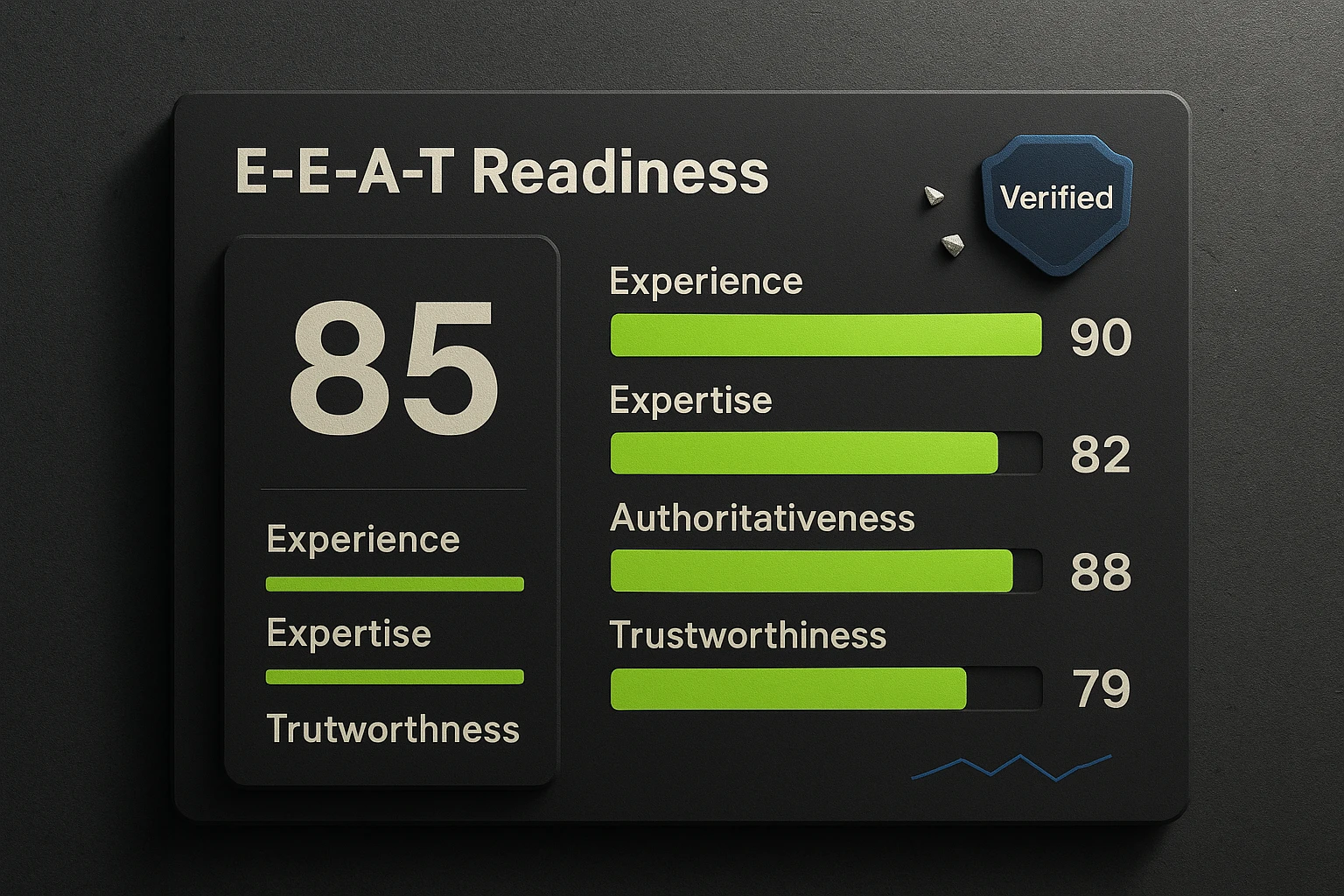Your Guide to E-E-A-T in the AI Era: Building Unshakeable Trust for Your Small Business
AI Summary
You see it every day. AI is no longer a futuristic concept; it's a practical tool that between 68% and 76% of small businesses are already using to drive growth. The shift is happening faster than anyone predicted. Search is no longer just about a list of blue links. It's about AI Overviews providing direct answers, taking up as much as 76% of the screen on some devices.
For a small business, this presents a critical challenge. It's no longer enough to rank. You need to be the trusted source that AI systems cite. This is where Google’s E-E-A-T framework, Experience, Expertise, Authoritativeness, and Trustworthiness, becomes the most important factor for your online survival. The core question you're likely asking is not if you should use AI, but how you can use it to genuinely prove your credibility and become the definitive answer in your industry.
This guide provides that answer. We'll walk through a practical, human-first framework for using AI not to replace your unique value, but to amplify it, ensuring your business thrives in the new era of AI search.
The New Rules of Trust: Why E-E-A-T is Your Foundation
First, let's demystify the E-E-A-T framework in today's context.
- Experience: Do you have firsthand, real-world knowledge of your subject? AI can't fake the insights gained from years of running your business.
- Expertise: Do you possess advanced skills or knowledge in your field? This is about demonstrating your qualifications.
- Authoritativeness: Are you a recognized, go-to source in your industry? This is often validated by mentions and links from other respected sites.
- Trustworthiness: Is your business reliable, honest, and transparent? Google has stated that Trust is the most critical part of the E-E-A-T family.
In the past, these signals were primarily for human searchers. Now, they are the primary quality check for AI systems. An AI will only cite content it deems credible. Strong E-E-A-T is what makes your content eligible for those coveted spots in AI Overviews, with research showing 52% of citations come from top-ranking results.
The key is a "Human-First, AI-Second" approach. Generic, soulless AI content is easy to spot and fails the E-E-A-T test. Your unique human experience is the starting point. AI is the powerful tool you use to structure, scale, and showcase that experience.
Phase 1: Using AI to Prove Your Real-World Experience
The "E" for Experience is the newest addition to the framework, and it's your greatest advantage over larger, more generic competitors. Your firsthand knowledge is a powerful asset. AI can help you capture and present it in a way that search engines can verify.
AI for Structured Storytelling
Think about all the raw experience stored within your business: client call notes, project management data, customer feedback emails, and internal team discussions. This is gold. AI tools can transform this unstructured information into compelling narratives.
- AI Transcription Tools: Use services like Otter.ai or Fireflies.ai to transcribe client interviews or testimonial videos. This creates text-based proof of your successful work and happy customers.
- AI Content Summarizers: Feed your project notes or raw data into an AI summarizer to generate concise project overviews or data-backed case study outlines. This saves hours of work and helps you consistently publish proof of your expertise.
This process isn't about creating fiction. It's about systematically documenting reality. By following a human-led workflow, you ensure every piece of content is rooted in verifiable truth, making your experience tangible to both users and AI.

Phase 2: Scaling Expertise and Authority with Smart AI Tools
Once you've established a foundation of experience, you can use AI to amplify your expertise and build industry authority. This is where you move from showing what you've done to proving you're a leader in your field.
AI-Assisted Expert Sourcing and Verification
True experts collaborate and cite other authoritative sources. AI can accelerate this process.
- Expert Identification: Use AI-powered search tools or platforms to identify relevant subject matter experts for interviews or collaborative content. This strengthens your content's credibility.
- Content Verification: Before you publish, use AI tools for fact-checking and plagiarism detection. This simple step is a powerful trust signal, showing you are committed to accuracy.
Choosing Your E-E-A-T AI Toolkit
The market is flooded with AI tools, and with 60% of non-adopters citing a lack of expertise as a barrier, choosing the right ones is crucial. You don't need a massive budget. The focus should be on a curated set of tools that directly impacts each component of E-E-A-T. Look for solutions that help you structure data, verify facts, and manage your online reputation efficiently.

Simplified Schema for AI Clarity
Schema markup is code that helps search engines understand the context of your content. Implementing Person and Organization schema is like giving AI a business card for you and your company. It explicitly states who you are, your credentials, and your relationship to the content. Many AI-powered SEO tools can now generate this schema for you, removing the technical barrier for small business owners. To ensure your website is fully understood, you need to think about how your content becomes part of the knowledge base for LLM-indexed pages. This technical step is critical for building authority.
Phase 3: Building Bulletproof Trustworthiness with AI
Trust is the bedrock of E-E-A-T. It’s built through consistency, transparency, and reliability. AI can act as your vigilant assistant in maintaining and growing that trust across the web.
AI-Powered Reputation Management
Your online reputation is an aggregate of reviews, comments, and mentions across countless platforms. Manually tracking this is impossible for a small team.
- Sentiment Analysis: AI tools can monitor mentions of your brand online and analyze the sentiment. This allows you to proactively identify potential issues before they escalate.
- Intelligent Responses: While responses should always be human-reviewed for empathy, AI can help draft initial replies to common customer feedback, ensuring timely and consistent communication.
Maintaining a Consistent Digital Footprint
Trust is also built on consistency. AI tools can help monitor your business name, address, and phone number (NAP) across online directories, ensuring the information AI systems find is accurate and uniform. This consistency is a fundamental, yet often overlooked, trust signal. The goal is to produce high-quality, trustworthy content tuned for AI consumption, which reinforces your credibility at scale.
Are You Ready for AI-Driven Search? Your E-E-A-T Scorecard
Making confident decisions requires a clear understanding of where you stand. Before diving in, assess your current E-E-A-T strengths. This quick readiness check can help you prioritize your efforts and focus on the areas with the greatest potential for impact. Answering these questions will provide clarity on where to begin your AI-augmented E-E-A-T journey.

Once you've identified your opportunities, you can explore advanced topics like measuring brand frequency in generative search to track your progress and refine your strategy over time.
Frequently Asked Questions
Can AI really help my business seem more authentic?
Yes, when used correctly. The key is to use AI to structure, verify, and amplify your real experiences and expertise, not to invent them. Think of AI as a tool to build a better stage for your authentic story, helping you share case studies, testimonials, and firsthand insights more effectively and consistently.
Do I need a big budget for these AI tools?
No. Many powerful AI tools offer free tiers or are very affordable for small businesses. The strategy outlined here prioritizes intelligent application over expensive software. The return on investment comes from using these tools strategically to save time and enhance credibility, not from buying the most feature-rich platform.
Do I need a big budget for these AI tools?
Google's policies focus on the quality and helpfulness of the content, not the tools used to create it. A human-first workflow, where AI assists in research, structuring, and verification while a human expert provides the core insights and final approval, aligns perfectly with Google's guidelines. The penalty risk comes from low-quality, unhelpful, or spammy content, regardless of how it was made.
How is this different from traditional SEO?
While traditional SEO often focuses on keywords and backlinks, this approach is about optimizing for answers and entities. The goal is to establish your business as a recognized, trusted entity in your niche. This requires deeper signals of credibility, like consistent brand mentions, verifiable author expertise, and structured proof of real-world experience, which AI is uniquely positioned to help you scale. You'll need to find the right AI tools with semantic understanding of business content to succeed.
Your Path to Becoming the Trusted Answer
The shift to an AI-driven search landscape is an opportunity, not a threat. For small businesses, your genuine experience and deep expertise are more valuable than ever. By adopting a human-first, AI-second approach, you can build unshakeable trust and establish your brand as the definitive source in your industry.
The goal is simple: don't just be another search result. Be the answer.
If you're ready to build a robust E-E-A-T strategy that positions your business for long-term success, let's talk. Our SEO Strategist can help you to scale your credibility and revenue.


